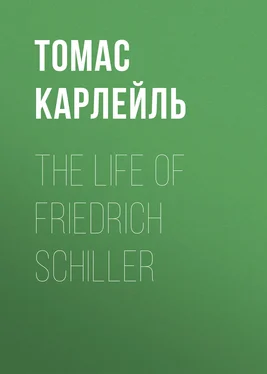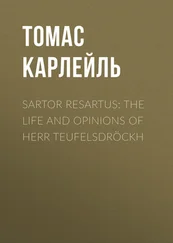Томас Карлейль - The Life of Friedrich Schiller
Здесь есть возможность читать онлайн «Томас Карлейль - The Life of Friedrich Schiller» — ознакомительный отрывок электронной книги совершенно бесплатно, а после прочтения отрывка купить полную версию. В некоторых случаях можно слушать аудио, скачать через торрент в формате fb2 и присутствует краткое содержание. Жанр: Биографии и Мемуары, Философия, foreign_edu, foreign_antique, на английском языке. Описание произведения, (предисловие) а так же отзывы посетителей доступны на портале библиотеки ЛибКат.
- Название:The Life of Friedrich Schiller
- Автор:
- Жанр:
- Год:неизвестен
- ISBN:нет данных
- Рейтинг книги:3 / 5. Голосов: 1
-
Избранное:Добавить в избранное
- Отзывы:
-
Ваша оценка:
- 60
- 1
- 2
- 3
- 4
- 5
The Life of Friedrich Schiller: краткое содержание, описание и аннотация
Предлагаем к чтению аннотацию, описание, краткое содержание или предисловие (зависит от того, что написал сам автор книги «The Life of Friedrich Schiller»). Если вы не нашли необходимую информацию о книге — напишите в комментариях, мы постараемся отыскать её.
The Life of Friedrich Schiller — читать онлайн ознакомительный отрывок
Ниже представлен текст книги, разбитый по страницам. Система сохранения места последней прочитанной страницы, позволяет с удобством читать онлайн бесплатно книгу «The Life of Friedrich Schiller», без необходимости каждый раз заново искать на чём Вы остановились. Поставьте закладку, и сможете в любой момент перейти на страницу, на которой закончили чтение.
Интервал:
Закладка:
Alfieri and Schiller were again unconscious competitors in the history of Mary Stuart. But the works before us give a truer specimen of their comparative merits. Schiller seems to have the greater genius; Alfieri the more commanding character. Alfieri's greatness rests on the stern concentration of fiery passion, under the dominion of an adamantine will: this was his own make of mind; and he represents it, with strokes in themselves devoid of charm, but in their union terrible as a prophetic scroll. Schiller's moral force is commensurate with his intellectual gifts, and nothing more. The mind of the one is like the ocean, beautiful in its strength, smiling in the radiance of summer, and washing luxuriant and romantic shores: that of the other is like some black unfathomable lake placed far amid the melancholy mountains; bleak, solitary, desolate; but girdled with grim sky-piercing cliffs, overshadowed with storms, and illuminated only by the red glare of the lightning. Schiller is magnificent in his expansion, Alfieri is overpowering in his condensed energy; the first inspires us with greater admiration, the last with greater awe.
This tragedy of Carlos was received with immediate and universal approbation. In the closet and on the stage, it excited the warmest applauses equally among the learned and unlearned. Schiller's expectations had not been so high: he knew both the excellencies and the faults of his work; but he had not anticipated that the former would be recognised so instantaneously. The pleasure of this new celebrity came upon him, therefore, heightened by surprise. Had dramatic eminence been his sole object, he might now have slackened his exertions; the public had already ranked him as the first of their writers in that favourite department. But this limited ambition was not his moving principle; nor was his mind of that sort for which rest is provided in this world. The primary disposition of his nature urged him to perpetual toil: the great aim of his life, the unfolding of his mental powers, was one of those which admit but a relative not an absolute progress. New ideas of perfection arise as the former have been reached; the student is always attaining, never has attained.
Schiller's worldly circumstances, too, were of a kind well calculated to prevent excess of quietism. He was still drifting at large on the tide of life; he was crowned with laurels, but without a home. His heart, warm and affectionate, fitted to enjoy the domestic blessings which it longed for, was allowed to form no permanent attachment: he felt that he was unconnected, solitary in the world; cut off from the exercise of his kindlier sympathies; or if tasting such pleasures, it was 'snatching them rather than partaking of them calmly.' The vulgar desire of wealth and station never entered his mind for an instant: but as years were added to his age, the delights of peace and continuous comfort were fast becoming more acceptable than any other; and he looked with anxiety to have a resting-place amid his wanderings, to be a man among his fellow-men.
For all these wishes, Schiller saw that the only chance of fulfilment depended on unwearied perseverance in his literary occupations. Yet though his activity was unabated, and the calls on it were increasing rather than diminished, its direction was gradually changing. The Drama had long been stationary, and of late been falling in his estimation: the difficulties of the art, as he viewed it at present, had been overcome, and new conquests invited him in other quarters. The latter part of Carlos he had written as a task rather than a pleasure; he contemplated no farther undertaking connected with the Stage. For a time, indeed, he seems to have wavered among a multiplicity of enterprises; now solicited to this, and now to that, without being able to fix decidedly on any. The restless ardour of his mind is evinced by the number and variety of his attempts; its fluctuation by the circumstance that all of them are either short in extent, or left in the state of fragments. Of the former kind are his lyrical productions, many of which were composed about this period, during intervals from more serious labours. The character of these performances is such as his former writings gave us reason to expect. With a deep insight into life, and a keen and comprehensive sympathy with its sorrows and enjoyments, there is combined that impetuosity of feeling, that pomp of thought and imagery which belong peculiarly to Schiller. If he had now left the Drama, it was clear that his mind was still overflowing with the elements of poetry; dwelling among the grandest conceptions, and the boldest or finest emotions; thinking intensely and profoundly, but decorating its thoughts with those graces, which other faculties than the understanding are required to afford them. With these smaller pieces, Schiller occupied himself at intervals of leisure throughout the remainder of his life. Some of them are to be classed among the most finished efforts of his genius. The Walk , the Song of the Bell , contain exquisite delineations of the fortunes and history of man; his Ritter Toggenburg , his Cranes of Ibycus , his Hero and Leander , are among the most poetical and moving ballads to be found in any language.
Of these poems, the most noted written about this time, the Freethinking of Passion ( Freigeisterei der Leidenschaft ), is said to have originated in a real attachment. The lady, whom some biographers of Schiller introduce to us by the mysterious designation of the 'Fräulein A * * *, one of the first beauties in Dresden,' seems to have made a deep impression on the heart of the poet. They tell us that she sat for the picture of the princess Eboli, in his Don Carlos ; that he paid his court to her with the most impassioned fervour, and the extreme of generosity. They add one or two anecdotes of dubious authenticity; which, as they illustrate nothing, but show us only that love could make Schiller crazy, as it is said to make all gods and men, we shall use the freedom to omit.
This enchanting and not inexorable spinster perhaps displaced the Mannheim Laura from her throne; but the gallant assiduities, which she required or allowed, seem not to have abated the zeal of her admirer in his more profitable undertakings. Her reign, we suppose, was brief and without abiding influence. Schiller never wrote or thought with greater diligence than while at Dresden. Partially occupied with conducting his Thalia , or with those more slight poetical performances, his mind was hovering among a multitude of weightier plans, and seizing with avidity any hint that might assist in directing its attempts. To this state of feeling we are probably indebted for the Geisterseher , a novel, naturalised in our circulating libraries by the title of the Ghostseer , two volumes of which were published about this time. The king of quacks, the renowned Cagliostro, was now playing his dextrous game at Paris; harrowing-up the souls of the curious and gullible of all ranks in that capital, by various thaumaturgic feats; raising the dead from their graves; and, what was more to the purpose, raising himself from the station of a poor Sicilian lacquey to that of a sumptuous and extravagant count. The noise of his exploits appears to have given rise to this work of Schiller's. It is an attempt to exemplify the process of hoodwinking an acute but too sensitive man; of working on the latent germ of superstition, which exists beneath his outward scepticism; harassing his mind by the terrors of magic,—the magic of chemistry and natural philosophy and natural cunning; till, racked by doubts and agonising fears, and plunging from one depth of dark uncertainty into another, he is driven at length to still his scruples in the bosom of the Infallible Church. The incidents are contrived with considerable address, displaying a familiar acquaintance, not only with several branches of science, but also with some curious forms of life and human nature. One or two characters are forcibly drawn; particularly that of the amiable but feeble Count, the victim of the operation. The strange Foreigner, with the visage of stone, who conducts the business of mystification, strikes us also, though we see but little of him. The work contains some vivid description, some passages of deep tragical effect: it has a vein of keen observation; in general, a certain rugged power, which might excite regret that it was never finished. But Schiller found that his views had been mistaken: it was thought that he meant only to electrify his readers, by an accumulation of surprising horrors, in a novel of the Mrs. Radcliffe fashion. He felt, in consequence, discouraged to proceed; and finally abandoned it.
Читать дальшеИнтервал:
Закладка:
Похожие книги на «The Life of Friedrich Schiller»
Представляем Вашему вниманию похожие книги на «The Life of Friedrich Schiller» списком для выбора. Мы отобрали схожую по названию и смыслу литературу в надежде предоставить читателям больше вариантов отыскать новые, интересные, ещё непрочитанные произведения.
Обсуждение, отзывы о книге «The Life of Friedrich Schiller» и просто собственные мнения читателей. Оставьте ваши комментарии, напишите, что Вы думаете о произведении, его смысле или главных героях. Укажите что конкретно понравилось, а что нет, и почему Вы так считаете.












